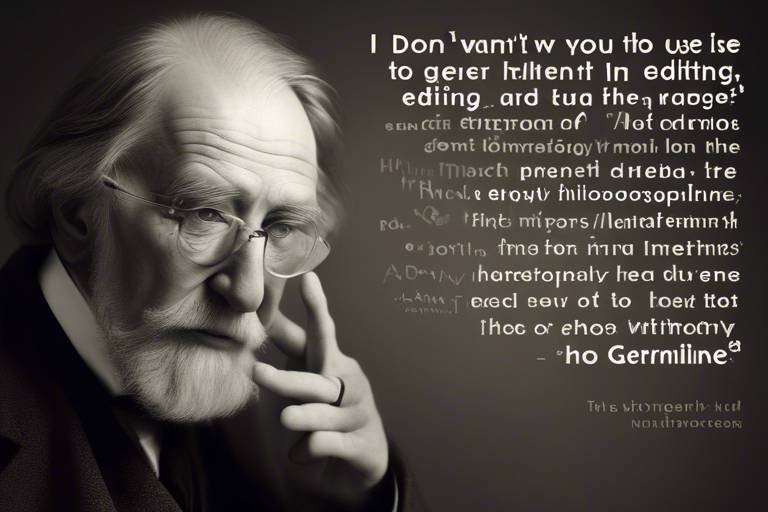Unraveling the Chaos Theory with Philosophy
Welcome to the fascinating world where chaos theory meets philosophy! You might be wondering, what exactly is chaos theory, and why does it matter? Well, think of chaos theory as a complex web—like a spider's intricate creation—where the smallest changes can lead to dramatically different outcomes. Just like how a butterfly flapping its wings in one part of the world can lead to a tornado in another, chaos theory reveals that our universe is anything but predictable. In this article, we’ll dive deep into how philosophical concepts can help us make sense of this chaos, shedding light on our understanding of existence, free will, and even the fabric of reality.
To truly appreciate the intersection of chaos theory and philosophy, we need to start with the basics. Chaos theory emerged from the field of mathematics and science, initially gaining traction in the late 20th century. It challenges our conventional understanding of systems, suggesting that even deterministic systems can exhibit unpredictable behavior. This unpredictability leads to a myriad of philosophical questions about our reality, our choices, and the very nature of knowledge itself.
As we explore this intricate dance between chaos and philosophy, we’ll uncover how chaos theory not only disrupts traditional notions of determinism and predictability but also invites us to rethink our place in the universe. It’s like peering through a kaleidoscope—what you see changes with every twist, revealing new patterns and colors that were previously hidden. So, are you ready to unravel the complexities of chaos theory and its philosophical implications? Let’s embark on this journey together!

The Foundations of Chaos Theory
Chaos theory is a captivating field that delves into the unpredictable and often seemingly random behavior of complex systems. At its core, chaos theory emerged from the study of dynamical systems, where small changes in initial conditions can lead to vastly different outcomes. This phenomenon is famously illustrated by the "butterfly effect," where a butterfly flapping its wings in one part of the world could theoretically influence a tornado in another. The origins of chaos theory can be traced back to the early 20th century, but it gained significant traction in the 1960s with the work of mathematician Edward Lorenz, whose research on weather modeling revealed the inherent unpredictability of atmospheric conditions.
One of the key principles of chaos theory is the concept of sensitivity to initial conditions. This means that even the tiniest variations in the starting point of a system can result in dramatically different outcomes. Imagine trying to predict the trajectory of a pinball machine; even the slightest angle change at the start can send the ball on a completely different path. This principle not only underlines the complexity of chaotic systems but also challenges our traditional understanding of predictability in science and philosophy.
Mathematically, chaos theory is rooted in non-linear dynamics. Unlike linear systems, where outputs are directly proportional to inputs, chaotic systems exhibit non-linear relationships that complicate predictions. To illustrate, consider a simple pendulum swinging back and forth. In a linear model, we could easily predict its motion. However, when we introduce non-linear factors, such as friction or varying force, the pendulum's behavior becomes much more unpredictable. This non-linearity is crucial to understanding chaos and plays a significant role in various scientific disciplines.
Another fundamental aspect of chaos theory is the presence of strange attractors. These are patterns that emerge in chaotic systems, representing a state toward which the system evolves over time, despite its apparent randomness. Strange attractors can be visualized as intricate, fractal-like structures that illustrate how order can arise from chaos. They serve as a bridge between the predictable and unpredictable, highlighting the dual nature of chaotic systems.
In summary, the foundations of chaos theory lie in its exploration of non-linear dynamics, sensitivity to initial conditions, and the emergence of strange attractors. This fascinating area of study not only reshapes our understanding of mathematics and science but also raises profound philosophical questions about the nature of reality itself. As we continue to unravel the complexities of chaos, we find ourselves questioning the very fabric of existence and our place within it.

Philosophical Implications of Chaos
Chaos theory, at its core, shakes the very foundations of traditional philosophy by introducing a level of unpredictability that challenges our long-held beliefs about the universe. Have you ever wondered how a simple butterfly flapping its wings can lead to a tornado on the other side of the world? This is the essence of chaos theory—it reveals that small changes can have monumental consequences, ultimately leading us to question the nature of reality itself. As we delve into the philosophical implications of chaos, we find ourselves at a crossroads, where determinism meets indeterminism, and where our understanding of free will is put to the test.
The implications of chaos theory stretch far and wide, prompting us to reevaluate concepts that have been staples of philosophical thought for centuries. For example, the traditional view of a deterministic universe, where every event is predestined and predictable, is now being challenged. In a chaotic system, the outcome can be influenced by initial conditions in ways that are almost impossible to predict. This brings us to a pivotal question: if our universe is inherently chaotic, what does that mean for our understanding of determinism and indeterminism? Are our lives governed by a strict set of rules, or are we merely navigating through a sea of random events?
One of the most intriguing aspects of chaos theory is its impact on the concept of free will. If the universe operates on chaotic principles, does that mean our choices are less meaningful? Or does it enhance our agency, suggesting that within the chaos, we have the power to influence outcomes? This leads to a deeper exploration of human decision-making. Imagine trying to predict your next move in a game of chess, where every piece on the board represents a chaotic element. Just like in life, the unpredictability of the game can lead to unexpected victories or losses. The essence of free will in a chaotic universe becomes a philosophical puzzle, inviting us to consider the balance between fate and choice.
Moreover, chaos theory invites us to rethink the limitations of predictability and control. In a world where chaos reigns, our desire to impose order can feel futile. We often seek to control our environments—be it through technology, governance, or personal relationships—but chaos reminds us that not everything can be neatly packaged. The unpredictability inherent in chaotic systems teaches us humility, encouraging a mindset that embraces uncertainty rather than fearing it. This notion can be liberating; it allows us to accept that life is not always a linear path but a complex web of interactions, where the unexpected can lead to new opportunities.
As we navigate through these philosophical waters, it becomes clear that chaos theory does not just belong to the realm of mathematics or science; it has profound implications for our understanding of existence itself. The interplay between chaos and order invites a rich dialogue about how we perceive our place in the universe. Are we mere spectators in a chaotic dance, or are we active participants capable of shaping the rhythm of our lives? The answers may not be definitive, but the questions themselves are invaluable in deepening our understanding of the human experience.
- What is chaos theory? Chaos theory is a branch of mathematics and science that studies complex systems whose behavior is highly sensitive to initial conditions, often referred to as the "butterfly effect."
- How does chaos theory relate to philosophy? Chaos theory challenges traditional philosophical concepts such as determinism and free will, prompting a reevaluation of our understanding of existence and human agency.
- Can chaos theory explain human behavior? Yes, chaos theory can provide insights into unpredictable patterns in human behavior and social dynamics, highlighting the complexity of decision-making processes.

Determinism vs. Indeterminism
When diving into the murky waters of chaos theory, one cannot help but stumble upon the age-old debate between determinism and indeterminism. At its core, determinism posits that every event or action is the result of preceding events in accordance with the laws of nature. Imagine a perfectly functioning clock: each gear and cog turns in a precise sequence, leading to a predictable outcome. However, chaos theory throws a wrench into this clockwork universe, suggesting that even the tiniest variations can lead to vastly different outcomes. This unpredictability raises profound questions about our understanding of reality.
Indeterminism, on the other hand, embraces the idea that not all events are determined by preceding causes. In chaotic systems, small changes can result in dramatically different results, akin to the flap of a butterfly's wings leading to a hurricane on the other side of the world. This notion challenges the deterministic view and opens the door to questions about free will and moral responsibility. If our choices are influenced by chaotic processes, to what extent can we claim to be the architects of our own destinies?
To further illustrate this tension, consider the following table that outlines key differences between determinism and indeterminism:
| Aspect | Determinism | Indeterminism |
|---|---|---|
| Nature of Events | All events are predetermined | Events can occur randomly |
| Predictability | Highly predictable | Unpredictable outcomes |
| Implications for Free Will | Challenges the concept of free will | Supports the idea of free will |
| Philosophical Roots | Rooted in classical physics | Influenced by quantum mechanics |
This clash between determinism and indeterminism is not just an abstract philosophical exercise; it has real-world implications. For instance, in the realm of morality, if our actions are merely the product of chaotic influences, can we hold individuals accountable for their choices? This question resonates deeply in legal and ethical discussions, where the line between accountability and chaos becomes increasingly blurred.
Moreover, the implications extend to our understanding of human agency. If we accept that chaos plays a significant role in our decision-making processes, we might begin to view ourselves not as mere puppets on a string, but as players in a complex game where the rules can change unexpectedly. This perspective invites a more nuanced understanding of personal responsibility, urging us to consider the chaotic factors that influence our lives.
In conclusion, the interplay between determinism and indeterminism within chaos theory is a fascinating realm that challenges our perceptions of reality, free will, and moral responsibility. As we continue to unravel the complexities of chaotic systems, we are compelled to rethink our understanding of existence itself. Are we merely cogs in a deterministic machine, or do we possess the ability to navigate the unpredictable currents of life? The answer may lie in the chaotic dance between these two philosophical perspectives.

Free Will in a Chaotic Universe
The concept of free will has long been a hot topic in philosophical discussions, and when we throw chaos theory into the mix, things get even more intriguing. Imagine a world where every decision we make is akin to a butterfly flapping its wings in Brazil, potentially causing a tornado in Texas. In a chaotic universe, the unpredictability of outcomes raises profound questions about our autonomy and decision-making processes.
At its core, chaos theory suggests that even small changes in initial conditions can lead to vastly different outcomes. This idea challenges the traditional notion of determinism, where every event is seen as a direct consequence of preceding events. If the universe is indeed chaotic, can we still claim to have free will? Or are our choices merely the result of a complex web of interactions and influences that we cannot fully comprehend?
To understand this better, let’s consider a few key points:
- Complexity of Decision-Making: Our choices are influenced by a multitude of factors, including our environment, past experiences, and even random occurrences. This complexity can make it difficult to pinpoint where free will begins and ends.
- Illusion of Control: In a chaotic system, the illusion of control can be strong. We might feel like we are steering our lives in a particular direction, but chaos can intervene at any moment, altering our path in unexpected ways.
- Human Agency: While chaos may limit predictability, it does not entirely negate our ability to act. We still make choices, but those choices exist within a framework of uncertainty.
So, what does this mean for our understanding of free will? Some philosophers argue that chaos theory supports a more nuanced view of free will, one that acknowledges the randomness and unpredictability of life while still affirming our capacity for choice. It's like navigating a river: while the current may be strong and unpredictable, we still have the ability to steer our boat in the direction we choose.
In conclusion, the interplay between chaos theory and free will invites us to rethink our assumptions about agency and responsibility. As we grapple with the complexities of a chaotic universe, we might find that our freedom lies not in absolute control, but in our ability to navigate the unpredictable waters of existence with intention and awareness.

Predictability and Control
When we think about our lives, the desire for predictability and control often feels like a fundamental part of our human experience. We crave the comfort of knowing what’s coming next, whether it’s planning our week or forecasting the weather. However, chaos theory throws a wrench into this comforting notion. It reveals that in many systems, especially those that are complex and interconnected, predictability is not just elusive—it may be entirely impossible.
Imagine trying to predict the path of a butterfly flapping its wings. The chaos theory suggests that such small actions can lead to significant and unpredictable outcomes, a phenomenon often referred to as the butterfly effect. This idea forces us to confront the limitations of our understanding and control over the universe. We can prepare for storms, but we cannot always predict their exact path or intensity. This unpredictability can be both exhilarating and terrifying. It challenges our need for control and raises profound questions about how we navigate our lives amidst uncertainty.
In chaotic systems, small changes can lead to vastly different outcomes. This is particularly evident in fields like meteorology, where predicting the weather is notoriously difficult. A minor shift in temperature or pressure can result in a completely different forecast. The same principle applies to social systems, where individual actions can ripple outwards, leading to unexpected societal changes. This unpredictability can be frustrating, especially for those who seek to impose order on their surroundings.
While chaos theory teaches us that complete control is an illusion, it does not render our efforts futile. Instead, it encourages a more nuanced understanding of control. We can still influence systems, but we must recognize the limits of our influence. For instance, in economics, while market trends can often be anticipated, the exact movements of stocks can remain unpredictable. Investors might use various strategies to manage risk, but the inherent chaos of the market means that outcomes can still defy expectations.
Ultimately, embracing the unpredictability of chaotic systems can lead to a more flexible mindset. Instead of striving for absolute control, we can learn to adapt to changing circumstances. This adaptability can foster resilience, allowing us to respond to life’s uncertainties with confidence rather than fear. In a world where chaos reigns, the ability to navigate unpredictability becomes a valuable skill, enabling us to thrive even when we cannot foresee the future.
- What is chaos theory? Chaos theory is a branch of mathematics focused on systems that appear disordered but are, in fact, governed by underlying patterns and deterministic laws.
- How does chaos theory relate to predictability? Chaos theory illustrates that even small changes in initial conditions can lead to vastly different outcomes, making long-term predictability in chaotic systems nearly impossible.
- Can chaos theory apply to everyday life? Yes, chaos theory can be observed in various aspects of life, such as weather patterns, traffic flow, and even human behavior, highlighting the unpredictability of complex systems.
- What are the implications of chaos theory for free will? The unpredictability introduced by chaos theory raises questions about determinism and free will, suggesting that our choices may be influenced by chaotic factors beyond our control.

Philosophy of Science and Chaos
The philosophy of science is a fascinating field that questions the very foundations of scientific inquiry, and when we introduce chaos theory into the mix, things get even more intriguing. Chaos theory, with its emphasis on unpredictability and complex systems, challenges traditional notions of scientific methodology. It forces scientists and philosophers alike to reconsider how we understand the natural world and the principles that govern it. Imagine trying to predict the weather; one day it might be sunny, and the next, a storm could roll in unexpectedly. This unpredictability is not just a nuisance; it’s a fundamental aspect of how chaotic systems operate.
At the heart of chaos theory lies the idea that small changes in initial conditions can lead to vastly different outcomes, a phenomenon often referred to as the butterfly effect. This concept can be likened to tossing a pebble into a pond—the ripples spread out, and their impact can be felt far beyond the initial splash. In the realm of scientific inquiry, this raises profound questions about causality and predictability. If tiny variations can lead to dramatically different results, how can we ever claim to fully understand a chaotic system? This dilemma is at the intersection of science and philosophy, prompting a reevaluation of our assumptions about the nature of reality.
Furthermore, chaos theory challenges the very essence of scientific models. Traditional scientific models often rely on the assumption that systems are linear and predictable. However, chaotic systems defy this expectation. They are characterized by non-linear relationships, where outcomes can be highly sensitive to initial conditions. This complexity can lead to a shift in how we interpret scientific theories. For instance, rather than viewing theories as definitive explanations of phenomena, we might start to see them as tools that help us navigate the unpredictable landscape of reality.
The implications of chaos theory extend beyond the realm of scientific methodology. It invites us to consider the limitations of our knowledge and the role of uncertainty in science. Just as a sailor must adjust their sails to the unpredictable winds of the sea, scientists must adapt their approaches to the chaotic behaviors of the systems they study. This adaptability is crucial for progressing in fields such as meteorology, economics, and even biological sciences. As we embrace the chaotic nature of these systems, we open ourselves up to new ways of thinking and understanding.
In conclusion, the intersection of chaos theory and the philosophy of science is a rich and complex area of study. It challenges our traditional views on determinism, predictability, and the nature of scientific inquiry itself. As we delve deeper into the chaotic realms of existence, we are reminded that the universe is not merely a puzzle to be solved but a dynamic tapestry of interactions that defy simple explanations. The philosophy of science, when viewed through the lens of chaos theory, becomes a journey of exploration and discovery, inviting us to embrace uncertainty and complexity as essential aspects of our understanding of the world.

Applications of Chaos Theory
Chaos theory isn't just an abstract concept confined to the realms of mathematics and physics; its applications ripple across various fields, demonstrating how unpredictability can shape our understanding of the world. From the swirling patterns of weather systems to the seemingly erratic behavior of financial markets, chaos theory provides a framework that helps us make sense of complexity. Imagine trying to predict the stock market or the weather—both are influenced by countless variables, many of which are interrelated in unpredictable ways. This is where chaos theory shines, offering insights that can lead to better decision-making and forecasting.
One notable application of chaos theory is in weather forecasting. Meteorologists use chaotic models to predict weather patterns, acknowledging that small changes in initial conditions can lead to vastly different outcomes. This is often referred to as the "butterfly effect," where the flap of a butterfly's wings in one part of the world could theoretically set off a tornado in another. By utilizing chaos theory, meteorologists can improve their models, making them more accurate over shorter time frames, even if long-term predictions remain elusive.
In addition to meteorology, chaos theory plays a crucial role in the field of economics. Economic systems are inherently chaotic due to the multitude of factors influencing markets, including consumer behavior, government policies, and global events. Traditional economic models often assume a level of predictability that simply isn’t there. By incorporating chaos theory, economists can better understand market fluctuations and the underlying dynamics that drive them. For instance, the stock market can behave chaotically, with prices influenced by news events, investor sentiment, and economic indicators. This unpredictability can be modeled to some extent, allowing for improved risk management and investment strategies.
Another fascinating application of chaos theory is in biology. Biological systems, from ecosystems to cellular processes, often exhibit chaotic behavior. For example, predator-prey relationships can lead to population cycles that seem erratic but can be understood through chaotic models. In medicine, chaos theory has been applied to understand heart rhythms, where chaotic patterns can indicate underlying health issues. By recognizing and analyzing these patterns, researchers can develop better diagnostic tools and treatment methods.
To illustrate the diverse applications of chaos theory, consider the following table:
| Field | Application | Example |
|---|---|---|
| Meteorology | Weather Forecasting | Predicting storms and temperature changes |
| Economics | Market Analysis | Stock market predictions and risk assessment |
| Biology | Population Dynamics | Studying predator-prey relationships |
| Engineering | Structural Analysis | Evaluating stability in complex systems |
As we can see, chaos theory offers valuable insights across various disciplines, revealing the underlying patterns in systems that may appear random at first glance. It's like finding a hidden thread that connects disparate elements of our world, helping us navigate the complexities of life with greater awareness.
In conclusion, the applications of chaos theory extend far beyond theoretical discussions. They provide practical tools for understanding and managing the unpredictable nature of our universe. Whether it's improving weather forecasts, analyzing economic trends, or understanding biological systems, chaos theory continues to influence a wide range of fields, enriching our comprehension of the chaos that surrounds us.
- What is chaos theory? Chaos theory is a branch of mathematics that studies complex systems whose behavior is highly sensitive to initial conditions, often leading to seemingly random outcomes.
- How does chaos theory apply to everyday life? Chaos theory can help explain unpredictable events in areas like weather, economics, and even personal decision-making, illustrating that small changes can lead to significant consequences.
- Can chaos theory predict the future? While chaos theory can improve our understanding of complex systems, it cannot predict specific outcomes due to the inherent unpredictability of chaotic behavior.

Chaos in Natural Systems
When we think about chaos, our minds might drift to the unpredictable weather patterns that seem to change at the drop of a hat. But chaos in natural systems goes far beyond just meteorology. It’s a fascinating realm where unpredictability reigns, and understanding it can be the key to unlocking the mysteries of our world. Imagine a butterfly flapping its wings in Brazil, setting off a tornado in Texas—a classic example of the butterfly effect. This metaphor illustrates how tiny changes in initial conditions can lead to vastly different outcomes, highlighting the inherent unpredictability of chaotic systems.
Natural systems, such as ecosystems and weather patterns, are prime examples of chaos in action. Take ecosystems, for instance. They are not merely collections of organisms; they are intricate webs of interactions that can shift dramatically with even the slightest change. For example, the introduction of a new species can lead to unforeseen consequences, altering food webs and population dynamics in ways that are difficult to predict. This unpredictability is not just a quirk of nature; it’s a fundamental characteristic of complex systems.
Weather systems are another area where chaos thrives. Meteorologists often rely on sophisticated models to predict weather patterns, but these models are inherently limited by the chaotic nature of the atmosphere. A small error in measurement can lead to drastically different forecasts. This is why we sometimes hear that weather predictions become less reliable the further out they try to forecast. It’s not that meteorologists are bad at their jobs; it’s that they are grappling with a chaotic system that resists simple explanations.
Moreover, the chaos theory extends its tendrils into the realm of biology. Consider how the spread of diseases can exhibit chaotic behavior. The interaction between various factors—such as population density, mobility, and even social behaviors—can create unpredictable outbreaks. For instance, the spread of a virus can be influenced by a myriad of factors that are difficult to quantify, leading to different outcomes in seemingly similar situations. This unpredictability not only complicates public health responses but also emphasizes the need for a deeper understanding of chaos in biological systems.
In light of all this, it’s essential to recognize that chaos does not imply randomness. Instead, it suggests a complex order beneath the surface. Scientists and philosophers alike are beginning to appreciate that chaos can lead to new forms of order and structure. For example, the patterns seen in fractals—self-similar structures that emerge from chaotic systems—show that beauty can arise from complexity. This interplay between chaos and order invites us to rethink our relationship with nature and our understanding of the universe.
In summary, chaos in natural systems is a vivid reminder of the unpredictability that characterizes our world. From the weather to ecosystems and even the spread of diseases, chaotic behavior is woven into the fabric of nature. Embracing this chaos can lead to a richer understanding of the complexities that surround us, ultimately allowing us to navigate these unpredictable waters with greater insight and adaptability.
- What is chaos theory? Chaos theory is a branch of mathematics and science that studies complex systems whose behavior is highly sensitive to initial conditions.
- How does chaos theory relate to natural systems? Chaos theory helps explain the unpredictable behavior of natural systems, such as weather patterns and ecosystems, where small changes can lead to vastly different outcomes.
- Can chaos be predicted? While chaos theory allows for some understanding of complex systems, predicting specific outcomes in chaotic systems remains challenging due to their sensitivity to initial conditions.

Chaos in Social Sciences
Chaos theory isn't just a concept confined to the realms of mathematics and physics; it has made significant inroads into the social sciences as well. In our everyday lives, we often perceive social dynamics as predictable, but the truth is far more complex. Just like a butterfly flapping its wings can lead to a tornado on the other side of the world, small changes in social conditions can lead to vast, unpredictable outcomes. This unpredictability is a hallmark of chaotic systems, and it challenges our traditional understanding of social structures.
For instance, consider how public opinion can shift dramatically due to a single event—a viral video, a political scandal, or even a natural disaster. These events can create a ripple effect, influencing behavior and attitudes in ways that are difficult to foresee. In this context, chaos theory provides a framework for understanding these unexpected shifts. It encourages us to think beyond linear models of cause and effect, recognizing that social phenomena are often the result of complex interactions among numerous variables.
One fascinating application of chaos theory in social sciences is in the field of economics. Economists have long grappled with the challenge of predicting market behaviors, which are influenced by countless factors, including consumer confidence, geopolitical events, and even weather patterns. Traditional economic models often assume a degree of predictability, but chaos theory suggests that markets can behave erratically, making them susceptible to sudden changes. This has led to the development of new models that incorporate chaotic dynamics, allowing for a more nuanced understanding of economic fluctuations.
Moreover, chaos theory sheds light on social networks and their dynamics. In a world where social media plays a pivotal role, the interconnectedness of individuals can lead to chaotic behavior in collective decision-making. The spread of misinformation, for example, can create feedback loops that amplify false narratives, demonstrating how easily public perception can spiral out of control. Understanding these chaotic interactions can empower social scientists to devise strategies that promote more informed public discourse.
In summary, chaos theory offers valuable insights into the complexities of social sciences. By embracing the unpredictable nature of human behavior, researchers can better navigate the intricacies of societal dynamics. As we explore the chaotic elements of our social world, we begin to appreciate the beauty of complexity and the importance of adaptability in our approaches to understanding and influencing social change.
- What is chaos theory? Chaos theory is a branch of mathematics focused on systems that appear disordered but are actually governed by underlying patterns and deterministic laws.
- How does chaos theory apply to social sciences? It helps to understand unpredictable social dynamics, such as shifts in public opinion, economic fluctuations, and the behavior of social networks.
- Can chaos theory predict future events? While chaos theory can identify patterns in complex systems, it emphasizes the inherent unpredictability of these systems, making precise predictions challenging.
- What are some real-world examples of chaos in social sciences? Examples include market crashes, viral social media trends, and sudden shifts in political sentiment.
Frequently Asked Questions
- What is chaos theory?
Chaos theory is a branch of mathematics and science that studies complex systems whose behavior is highly sensitive to initial conditions. This means that small changes in the starting point can lead to vastly different outcomes, making long-term prediction impossible in many cases.
- How does chaos theory relate to philosophy?
Chaos theory challenges traditional philosophical ideas about determinism and predictability. It prompts a reevaluation of concepts like free will and moral responsibility, suggesting that if the universe is inherently unpredictable, our understanding of human agency might need to be reconsidered.
- Can chaos theory provide insights into free will?
Yes! Chaos theory suggests that the unpredictability inherent in chaotic systems could influence our understanding of free will. If our decisions are part of a chaotic system, then they may not be as predetermined as once thought, allowing for a more nuanced view of human choice and agency.
- What are some real-world applications of chaos theory?
Chaos theory has practical applications in various fields, including:
- Weather forecasting
- Economics and market analysis
- Biological systems and ecology
These applications demonstrate how chaos theory can help us understand and navigate complex systems in the real world.
- How does chaos theory affect scientific methodology?
Chaos theory has significant implications for the philosophy of science, as it challenges the notion of predictability in scientific models. It encourages scientists to consider the limitations of their predictions and to embrace the complexity and uncertainty that come with studying chaotic systems.
- What are some examples of chaos in natural systems?
Examples of chaos in natural systems include:
- Weather patterns, which can change rapidly and unpredictably
- Ecosystems, where small changes can lead to significant shifts in population dynamics
- Fluid dynamics, such as turbulence in rivers and oceans
These examples highlight the inherent unpredictability and complexity of natural systems.
- How is chaos theory applied in the social sciences?
In social sciences, chaos theory helps analyze complex human behaviors and societal dynamics. It provides insights into how small changes in social conditions can lead to large-scale societal shifts, making it a valuable tool for sociologists and economists alike.



















